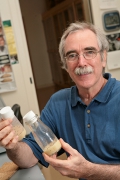About Tracy M. Sonneborn
Tracy Sonneborn had an eminent career both as an experimental scientist of international reputation and as a deeply committed teacher. He took both his B.A. and his Ph.D. from Johns Hopkins University in his native Baltimore, and remained at Johns Hopkins until 1939, when he came to Indiana University. As a researcher Dr. Sonneborn worked with Herbert Spencer Jennings and his experimental research, like that of his mentor, concentrated on the protozoa. His first major contribution to the field came in 1937 when he discovered mating types in Paramecium aurelia. The controlled mating which was consequently possible led to several fundamental discoveries, and on these Professor Sonneborn was able to pioneer the modern study of ciliate genetics. In over two hundred published articles on his findings as an experimental scientist Professor Sonneborn established a world-wide reputation as an authority on genetics.
Professor Sonneborn not only made rare and genuine contributions to human knowledge and understanding; he energetically and faithfully transmitted his knowledge to others. He first came to Indiana University in 1939 as an Associate Professor in Zoology, and the bulk of his teaching career was at this University. In 1953 he became a Distinguished Professor, and in 1976 a Distinguished Professor Emeritus. Professor Sonneborn was a dedicated teacher and though his eminence might have exempted him, he taught introductory and undergraduate courses in genetics. Greatly in demand, he held many visiting professorships, both in the United States and abroad. He taught at University College, London; at the University of Chile; at the Centre Nationale de Recherche Scientifique in France; at Princeton University; and at the University of Washington.
Professor Sonneborn's commitment to science had, moreover, involved devoting energies outside the laboratory and the classroom. He served on the National Academy Committee on Science Public Policy and on the Biology Panel of the National Science Foundation, among many other nationally important councils and commissions. He was President of the Genetics Society of America, the American Society of Naturalists, the American Society of Zoologists, and the American Institute of Biological Sciences.
Professor Sonneborn enjoyed many high honors in recognition of his work. He was a member of the National Academy of Science, of the American Philosophical Society, and of the American Academy of Arts and Sciences. He was a Foreign Member of the Royal Society of London, of the Japanese Genetics Society, and of the French Society of Protozoologists. He received the Newcomb-Cleveland Award of the American Association for the Advancement of Science, the Kimber Genetics Award of the National Academy of Sciences, and the Mendel Centennial Medal of the Czechoslovakian Academy of Sciences. He won teaching awards from Indiana University and honorary degrees from Johns Hopkins University, Northwestern University, and the University of Geneva.


